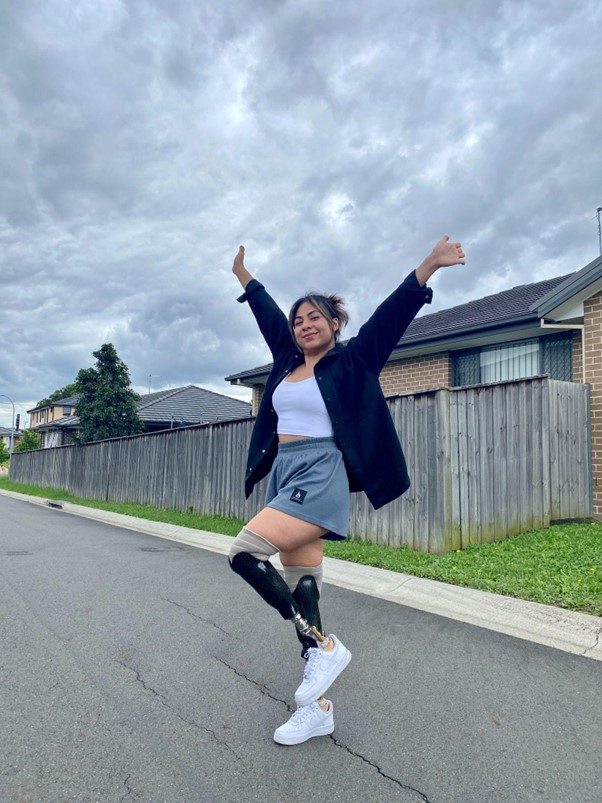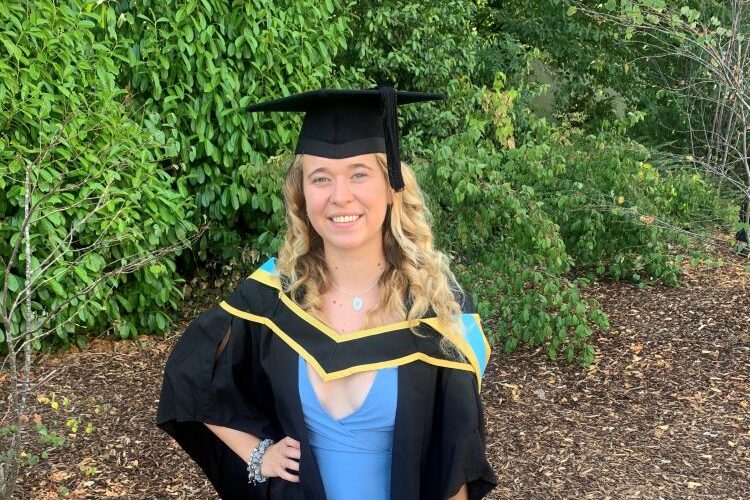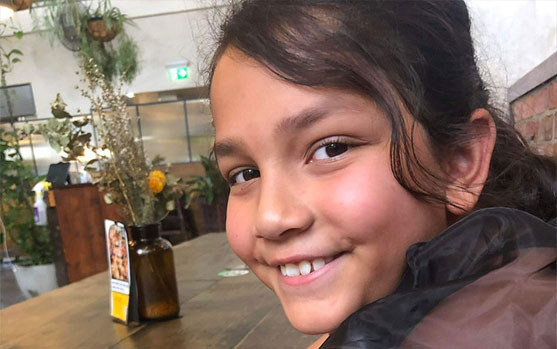The early signs
On October 12th 2018, I was at work doing the usual morning shift. Just after 10am I was feeling a bit off. I had a temperature, a slight headache and wanted to vomit. So I went to the bathroom and ended up vomiting. Then I took some Panadol and asked my supervisor to go see the medics at work. The medics measured my temperature and it was 39 degrees Celsius. I was contemplating whether I should stay and finish my shift or go home. I ended up asking the supervisor to leave early and went home. On the way home, I thought about visiting the GPs but I was too tired and didn’t want to sit and wait for ages, so I decided to go straight home. When I got home, I rang to make an appointment with the GP for the next day at 12pm in case I don’t get better. I got in bed and woke up from a nap to have dinner.
After I had a little bit of dinner, I was lying in bed with my sister next to me. We were trying to figure out what the illness could be while video calling my aunty in Thailand. The first thing we were worried about was meningitis. So, I checked by looking at the light and checked if I could bend my neck and they were all fine. The only thing that was unusual to me was when my dad came in to check on me, he touched my arm and I pulled back quickly and said that it hurts. I thought that was strange but still didn’t think much.
When things suddenly got worse
I slept through the night but woke up in the morning to vomit and had bad diarrhea. I was going back and forth between my bed and the bathroom numerous times. Until I was really thirsty so I went to grab a can of Solo and sculled the whole can quickly which I never do. And as soon as I finished the can I went straight to the bathroom again. This time, after I was washing my hands, I looked up in the mirror and all I saw was purple spots all over my face. I looked down at my arms and my body and they were there too. I straight away told my sister we needed to go to the emergency room ASAP.
My sister called my parents to see how far they were from home. They said they were more than 30 mins away. My mum told my sister to ring the ambulance. While I was lying in bed, my sister was on the phone. They transferred her call to one of the nurses. She asked all sorts of questions and got my sister to press on the purple spot on my hand to see if it would disappear. The nurse ended up telling my sister to get me to drink lots of water and see the doctor within six hours.
Luckily, we didn’t wait. As soon as my parents got home, we went to the emergency room which fortunately is not far from my house. At that point I couldn’t walk. My mum and my sister had to drag me to the car and my dad drove us to the emergency department. I waited approximately 10-15 mins further at the hospital before the triage nurse called me in. He tried to measure my blood pressure but couldn’t as it was too low. They wheeled me into the resuscitation room. I don’t remember how I got on the bed and got changed into a hospital gown. The last thing I remembered was the doctor saying to me “you are very very sick”.
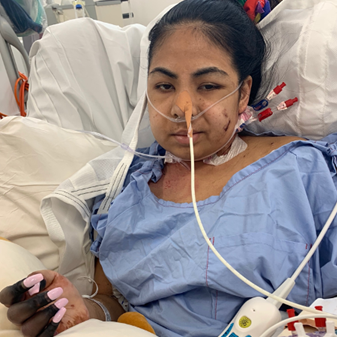
Juttima Chinnasri after waking up from her coma in 2018
Fighting for my life
It was the scariest time of my life. It was horrible. It was something you never expect to happen to you or anyone close to you, you know. I learned about meningitis. I knew about certain signs and symptoms but even then it still slipped my mind that it could be septicaemia.
Everything happened so quickly. We didn’t have time to process anything. I was so lost and confused. One minute you’re working doing your normal things, within less than 24 hours you’re fighting for your life.
Every minute was so crucial. I don’t think I can describe all the emotions I felt during the experience but the feeling of guilt, being scared and defeated were definitely there. I felt terrible that my family had to go through so much trauma because of me. I was on life support for almost a week with the chance of me surviving 50:50. We had to look at it day by day so I can’t imagine how my family felt during that time…they must have felt helpless waiting to hear the news.
The road to recovery
Although I feel very very lucky to make it out alive I can’t deny that the battle after surviving is a tough one. It changed my life forever. I was in the hospital for three months, I lost my legs, my fingers and my kidneys are impaired. Everything changed. I had to relearn everything again. It was the biggest setback that I had to learn to accept and move forward from. So it was physically and mentally challenging. Not just for me but for my loved ones as well.
A message to survivors
It was horrible. It was traumatic. It was tough. It’s a long journey that takes a lot of willpower. You need a lot of resilience, a lot of determination and a lot of patience. So if you have survived and you’re reading this, that means, you have survived the worst day of your life and everything from now is the new chapter and it is up to you. You have more control than you think.
From my experience, I think the hardest thing about life after meningitis is acceptance. If you lost part of your body or meningitis impacted your life in any way, you are going to grieve and that is what you should do without feeling guilty. You need to be kind to yourself and go through the emotions. When you finally reach the acceptance stage, that’s when everything starts to move forward. It’s not going to be easy but you will do it.
Find a good support system, family, friends, anyone you can trust and let them help you. Sometimes being strong is being brave enough to ask for help. Lean on your people! And if you can’t find one in real life, there are plenty online. So many communities and organisations are online that are willing to give you the support you need. That’s why I feel like sharing your story is so important. For me, it helped me get used to my new life. Write it out, talk it out. The more you talk about it, the more normal it will feel to you, and before you know it, you will look back and see how incredible you’ve been and how far you’ve come. It will help not just you but others who might be going through the same thing. It can also help raise awareness for this horrible disease and save lives.
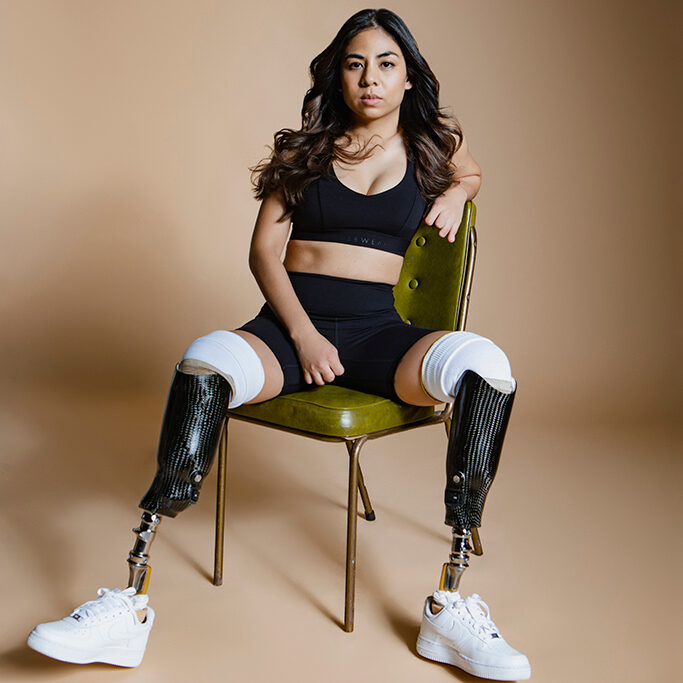
Despite everything, I feel like this was the greatest lesson in my life. It taught me to dig deep and made me realise how strong I actually am. I genuinely believe that anything else that comes at me after this, I trust myself that I’ll be able to handle it. And I’m certain you will feel the same about yourself too.
I want to remind you that you can use others as inspirations but don’t compare your journey to anyone. Every person takes a different time frame to move through the journey and to heal and to overcome. Set your own goal, take it one step at a time and focus on you. Be kind to yourself! No matter how good your support system is and how much they are willing to help you, if you don’t want to help yourself and pull yourself up, you will never move forward.
And for those around us, please be kind to everyone around you. You don’t know what they have been going through. If you can offer help and support, please do. It breaks my heart every time I hear about a case because I know the suffering. So if you can, please get vaccinated against meningitis, learn the signs and symptoms and be assertive if you suspect meningitis. We often have the mentality of “this would never happen to me” when we learn about rare and horrible diseases and that’s exactly what I thought about meningitis when I learnt about it. But in reality, you don’t know. It can happen to anyone, at any age, any time. So your best protection is to get vaccinated because your life isn’t worth the risk. I don’t want you or my family to go through what we did.
If you have survived and you’re reading this, that means you have survived the worst day of your life and everything from now is the new chapter and it is up to you. You have more control than you think.Juttima Chinnasri, model and social media influencer
Related stories
Share your story today
One story can change a life. 2,030 could change the world. Share yours today.

